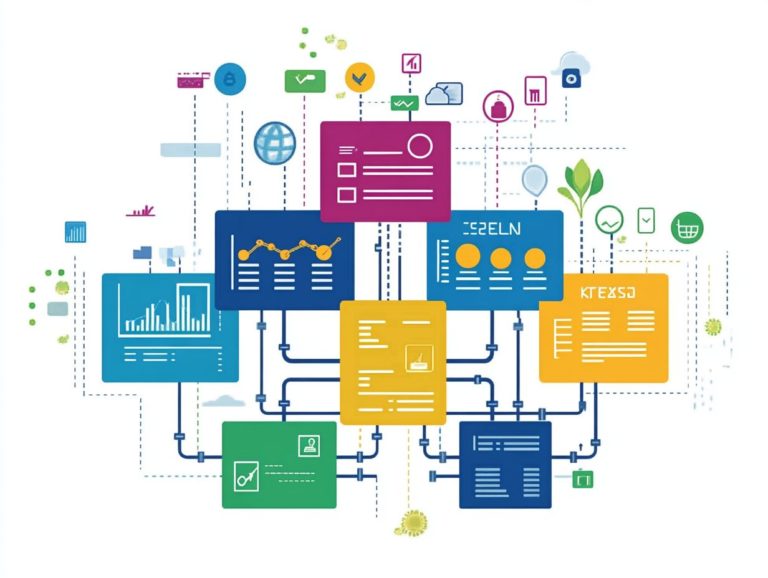Choosing Between PRINCE2 and PMP Certifications
In today s competitive job market, earning project management certifications like PRINCE2 and PMP can significantly elevate your career prospects. Ready to boost your career? Let’s dive in!
Each certification presents its own unique methods and approaches, making them ideal for various professional paths. This overview will explore the key differences between PRINCE2 and PMP, covering requirements to qualify, exam formats, and costs.
It will also explore the benefits of each certification, their global recognition, and the important factors to consider when selecting the right one for your career aspirations.
Contents
- Key Takeaways:
- Key Differences Between PRINCE2 and PMP
- Benefits and Advantages of PRINCE2 Certification
- Benefits and Advantages of PMP Certification
- Factors to Consider in Choosing Between PRINCE2 and PMP
- Preguntas Frecuentes
- Cu l es la diferencia entre las certificaciones PRINCE2 y PMP?
- Qu certificaci n es mejor para la gesti n de proyectos – PRINCE2 o PMP?
- Cu les son los requisitos de elegibilidad para las certificaciones PRINCE2 y PMP?
- Qu certificaci n tiene m s oportunidades laborales – PRINCE2 o PMP?
- Puedo tener ambas certificaciones PRINCE2 y PMP?
- Cu nto tiempo se necesita para prepararse para las certificaciones PRINCE2 y PMP?
Key Takeaways:

Overview of PRINCE2 and PMP
The PRINCE2 and PMP certifications are two of the most esteemed methods in project management, offering structured frameworks to drive successful project outcomes. PRINCE2, developed in the UK, emphasizes a process-driven approach and flexibility, while PMP, offered by the Project Management Institute in the USA, focuses on an in-depth understanding of the PMBOK guide, which stands for Project Management Body of Knowledge, outlining best practices for project management and its knowledge areas.
Both certifications cater to various project roles and organizational needs, making them essential for your career advancement and global recognition in the project management realm. These certifications emerged in response to the growing complexity of projects across different industries, establishing a common language and set of practices for effective project delivery.
PRINCE2 s emphasis on stages and products ensures that every detail of your project is meticulously planned and monitored, promoting risk management and quality control. On the other hand, the PMP framework encourages a broader perspective, highlighting the significance of strategic planning and stakeholder engagement throughout the project life cycle.
By achieving either certification, you not only validate your knowledge and skills but also enhance your credibility in the competitive job market, opening doors to diverse career opportunities and professional development.
Key Differences Between PRINCE2 and PMP
Grasping the key distinctions between PRINCE2 and PMP is crucial for aspiring project managers who seek to elevate their skills and expand their career opportunities in the field of project management. Understanding these differences enhances your skills and gives you an edge in an increasingly competitive landscape.
Methods and Approaches
Both PRINCE2 and PMP present unique methods designed to cater to the varied needs of project management. While PRINCE2 leans into process orientation, PMP shines a light on knowledge and competency. Each of these methods brings distinct advantages that can enhance different types of projects.
PRINCE2, which stands for “Projects IN Controlled Environments,” emphasizes a structured approach characterized by clearly defined phases, roles, and responsibilities. This structure allows you to maintain control throughout the project life cycle, making it particularly advantageous in settings where clarity and organization are paramount, such as in construction or IT projects.
Conversely, PMP covers a broad spectrum of knowledge areas and processes. This flexibility gives you the power to tailor your strategies to meet specific project demands, often proving invaluable in software development or intricate engineering tasks. This demonstrates how effectively each method can be applied depending on the context.
Eligibility Requirements
Eligibility requirements for PRINCE2 and PMP certifications differ significantly. To better understand these distinctions, consider navigating the world of project management certifications, as these are tailored to your project management experience and career aspirations.
PRINCE2 is designed for those stepping into project management or holding lower-tier roles. It emphasizes a structured methodology and offers specific training programs without the need for extensive prior experience.
In contrast, the PMP certification takes a more selective approach. Candidates must demonstrate enough project management experience and a defined number of hours leading and directing projects.
If you re looking for a solid entry point, the Certified Associate in Project Management (CAPM) certification is an excellent choice. It allows you to enter the field with minimal prerequisites, expanding your job prospects.
These differing requirements influence your immediate employment opportunities and play a pivotal role in shaping your long-term professional growth in this competitive market.
Exam Format and Cost

The exam formats and costs associated with PRINCE2 and PMP certifications are pivotal considerations as you seek to elevate your project management credentials.
Understanding the specifics of these exams greatly influences your decision-making. The PRINCE2 exam features multiple-choice questions that assess your knowledge of the methodology. The PMP exam presents situational questions designed to evaluate your problem-solving skills in real-world project scenarios.
Each exam has a defined duration, typically ranging from two to four hours. PRINCE2 generally requires a pass mark of around 65%, while PMP utilizes a more complex scoring system based on various question types.
Expect to invest anywhere from $300 to $600 for the certification alone. Additionally, you might spend $1,000 or more on training programs, which can significantly impact your overall return on investment.
Obtaining these certifications can open doors to better job opportunities and possibly higher salaries. It is essential for you to carefully weigh these factors as you move forward.
Benefits and Advantages of PRINCE2 Certification
Obtaining a PRINCE2 certification brings a wealth of advantages that can elevate your professional journey. It significantly enhances your career growth, grants you global recognition, and deepens your understanding of structured methodologies in project management.
This certification positions you as a knowledgeable leader in the field. It opens doors to new opportunities and sets you apart in a competitive landscape.
Global Recognition and Market Demand
PRINCE2 certification carries prestigious global recognition. This positions you as a highly sought-after professional across various industries, enhancing your job prospects.
The certification holds particular value in regions like the USA, UK, Europe, and Asia. Organizations increasingly seek skilled project managers capable of delivering projects on time and within budget.
In industries such as healthcare, finance, and construction, the demand for PRINCE2-certified individuals is substantial. These sectors often encounter complex regulatory and operational challenges.
As companies aim for heightened efficiency and robust risk management, professionals with PRINCE2 expertise offer a structured approach to project management. This makes you an invaluable asset in achieving organizational goals and driving successful outcomes across diverse projects.
Applicability in Different Industries
The PRINCE2 certification is applicable across various industries. It equips you with the skills needed to tackle diverse project management challenges.
In fields such as healthcare, finance, and government, this certification becomes invaluable. It provides a structured framework that aligns seamlessly with organizational goals and compliance requirements.
For example, in healthcare, PRINCE2 methodologies have been effectively employed to manage the rollout of new electronic health record systems. This ensures stakeholder engagement and adherence to public health regulations.
In the finance sector, organizations have harnessed PRINCE2 principles to streamline regulatory compliance projects. This leads to enhanced efficiency and reduced costs.
Each of these successful implementations highlights how you, as a project manager, can navigate complex requirements and deliver tangible results that positively impact your industry.
Benefits and Advantages of PMP Certification
Earning a PMP certification opens up a world of benefits, including improved career advancement opportunities, increased earning potential, and recognition as a knowledgeable project manager.
This qualification elevates your professional standing and positions you as a leader in your field, ready to tackle complex projects with confidence.
Widely Recognized and Established Certification

The PMP certification is a distinguished credential in project management, offering you a significant edge in the job market. This globally recognized certification could be your ticket to success, embellishing your resume and demonstrating your dedication to industry standards and best practices.
According to the Project Management Institute (PMI), individuals with PMP certification can command salaries up to 20% higher than their non-certified peers, making it a wise investment for your career progression.
Many certified professionals share that the PMP framework equips them with essential technical and leadership skills needed to navigate complex projects effectively. As businesses increasingly view PMP as the gold standard, this certification becomes an invaluable asset for advancing your career in today s competitive landscape.
Applicability in Different Industries
PMP certification is a valuable asset across a diverse range of industries, making it an exceptional choice for project managers like you who aim to elevate their skills and career opportunities.
Take the healthcare sector, for example. As a certified professional, you would be well-equipped to manage intricate projects involving the latest technology or patient care initiatives while navigating strict regulations.
In finance, your PMP training empowers you to tackle projects that demand precise risk management and effective communication with people involved in the project, ultimately driving both profitability and efficiency.
In construction, your certification is essential as you oversee large-scale projects, expertly coordinating schedules and resources to meet relentless deadlines.
Government agencies also stand to benefit significantly from your PMP qualifications, ensuring accountability and transparency in public projects.
The skills you acquire through this certification like leadership, risk assessment, and strategic planning enable you to align your projects seamlessly with organizational goals, no matter the sector you choose to thrive in.
Factors to Consider in Choosing Between PRINCE2 and PMP
When selecting between PRINCE2 and PMP certifications, it’s essential to evaluate various factors, including your career aspirations, existing project management experience, and consult a guide on how to choose the right project management certification based on your preferred learning style.
Career Goals and Aspirations
Understanding your career goals is crucial when contemplating whether to pursue PRINCE2 or PMP certification in project management.
These certifications cater to different professional paths and industries, meaning you need to align them with your individual objectives. For example, if you find yourself in the UK or Europe, PRINCE2 might be your go-to choice as it emphasizes process-driven project management. Conversely, understanding project management certifications like PMP has a broader international appeal, focusing on knowledge areas and best practices that resonate globally.
Each certification can significantly influence your long-term career progression, unlocking opportunities for higher-level positions, increased responsibilities, and potentially more attractive salaries. By carefully evaluating the nuances of these certifications and how they relate to your career trajectory, you can make informed decisions that position you strategically for future success.
Project Management Experience and Expertise
Your project management experience and expertise are crucial in determining whether the PRINCE2 or PMP certification aligns with your professional profile. For those considering their options, understanding the differences between PMP and PgMP certifications can also be helpful.
Understanding the details of both ways to manage projects gives you the power to assess your skills and responsibilities effectively. If you have a solid foundation in managing complex projects, the PMP certification focused on broader project management principles may complement your experience beautifully.
If you prefer a structured, process-driven approach, PRINCE2, which emphasizes defined processes and roles, may be a good fit. Evaluate your past roles now to choose the right certification!
By assessing the environments in which you ve thrived, you can make a well-informed decision about which certification will elevate your career and enhance your project management capabilities.
Personal Learning Preferences

Your individual learning preferences can play a crucial role in deciding between PRINCE2 and PMP certifications, influencing your preparation and professional growth.
Understanding whether you lean towards being a visual, auditory, or kinesthetic learner will help you tailor your study approach. If you re a visual learner, the diagrams and flowcharts that characterize PRINCE2 s structured approach may be particularly beneficial.
If you thrive on auditory learning, engaging in discussions and group study sessions could enhance your PMP preparation. For kinesthetic learners, diving into hands-on practice with real-world scenarios can significantly boost understanding.
To make the right certification choice, assess your preferred learning methods and select training programs that resonate with your style. This alignment will lead to a more effective and engaging learning experience.
Preguntas Frecuentes
Cu l es la diferencia entre las certificaciones PRINCE2 y PMP?
The main difference between PRINCE2 and PMP certifications is the methodology they follow. PRINCE2 is a structured project management methodology, while PMP is based on the PMBOK (Project Management Body of Knowledge).
Qu certificaci n es mejor para la gesti n de proyectos – PRINCE2 o PMP?
Both certifications are highly recognized and respected in the project management industry. Ultimately, it depends on the specific needs and requirements of the organization or project. PRINCE2 is more popular in Europe, while PMP is more widely recognized in the United States.
Cu les son los requisitos de elegibilidad para las certificaciones PRINCE2 y PMP?
The eligibility requirements for PRINCE2 certification depend on the level of certification you are seeking. For PMP certification, you need a minimum of 35 hours of project management education and a certain number of hours leading and directing projects.
Qu certificaci n tiene m s oportunidades laborales – PRINCE2 o PMP?
Both PRINCE2 and PMP certifications are highly valued by employers and can lead to job opportunities in project management. Understanding the difference between PMP and CAPM certifications is important, as it can help you research the job market and specific requirements for positions that interest you to determine which certification may be more beneficial.
Puedo tener ambas certificaciones PRINCE2 y PMP?
Yes, it is possible to hold both PRINCE2 and PMP certifications. In fact, having both can demonstrate a comprehensive understanding of project management methodologies and make you more attractive to potential employers.
Cu nto tiempo se necesita para prepararse para las certificaciones PRINCE2 y PMP?
The time required to prepare for PRINCE2 and PMP certifications can vary depending on your prior knowledge and experience in project management. On average, it may take 3 to 6 months of dedicated study and preparation to pass both exams.






